Mentioned: Kimya Dawson’s hugs, Peter Blood - Osama’s Daughter
Konstantin Samoilov: I am with Richard Hansen, living in Baltimore, Maryland. Richard enjoys “Hatred Has A Mother” by Jesca Hoop. Welcome, Richard.
Richard Hansen: Hey, what a pleasure to be with you in this venue.
Konstantin Samoilov: What do you feel when you listen to it, Richard?
Richard Hansen: I think it's just a surprising song. It's a bubbly, surprising song. I love — I feel inspired to action in some way when I listen to it, I suppose.
Konstantin Samoilov: What kind of action?
Richard Hansen: I guess what's interesting about it is you have all these trumpets and sort of horn sounds leading to something, leading to some action, and the action is more internal than anything, so it’s like looking in the mirror, giving yourself some love, right? Recognizing humanity in other people. So it's more internal introspective, I suppose, which is kind of cool.
Konstantin Samoilov: Do you also feel part of a bigger whole? Like it's a marching band type of sound. Are you imagining walking with a group of people or not?
Richard Hansen: Yeah, I think you would be walking with a group of — you know, you can imagine this because it's an introspective type of song. But yeah, I suppose in the mental landscape, that's what happens. You know, you're driving, you can sing along, you wanna sing with other people. The chorus, you know, it's nice.
Konstantin Samoilov: What do you want to do when you listen to it? Like, other than self-improvement or whatever? With other people, let's say.
Richard Hansen: What do I wanna do?
Konstantin Samoilov: Yeah.
Richard Hansen: With other people?
Konstantin Samoilov: Yeah, does it make you want to improve things about the world, let's say? I mean, it's such a sort of get-up-and-go sound.
Richard Hansen: Yeah, I suppose it makes you wanna interact with people in a more positive way, give people the benefit of the doubt. I don't know, it's a rare song because I think it encourages that sort of positivity, right? Viewing other people as human beings, even if… I don't know, I don't know what to say.
Konstantin Samoilov: Sure. How'd you discover it?
Richard Hansen: I was listening to WTMD. WTMD, baby, here in Baltimore.
Konstantin Samoilov: *See No Stranger: A Memoir and Manifesto of Revolutionary Love* by Valarie Kaur describes revolutionary love partly as “to see no stranger, but instead look at others and say: you are part of me I do not yet know.” Is this relevant to your connection to this song?
Richard Hansen: Of course! I mean, it's the basic premise to the song, isn't it, right? It's about looking in the mirror. It's about giving yourself that revolutionary love and spreading it to other people.
Konstantin Samoilov: If the lyrics were different, would your experience with this be like 50% different, 10% different, 90% different?
Richard Hansen: Like, 100% different, probably. 90%, we'll say 90% cuz it's got a peppy beat, it's a nice sound, but I'd say the lyrics — yeah, of course the message is in the song lyrics, but the way it's delivered I think is what kind of gives it that extra pop for me, I guess. It's got a nice message, but then the production… But yeah, it's the lyrics essentially.
Konstantin Samoilov: So the reason that you enjoy it: 90% due to the meaning?
Richard Hansen: I would say, yeah. It leaves me feeling happy, positive with some sort of different perspective on to take forward into the day, I guess.
Konstantin Samoilov: What is the human being version of the song? You can name a person that reminds you most, or you can create a person.
Richard Hansen: Oh. I mean, it would be someone who — I don't know if I know anyone particularly like this, right? But a very open kind of person. Someone who is just friendly toward everybody, you know, who might come around, gives everyone the benefit of the doubt.
I'm not sure what kind of a person this is, you hardly meet a person like this, right? Because we tend to get lost in recriminations of judgment or whatever when we meet people. But someone who can approach every interaction with an openness, I guess, and a genuineness.
Konstantin Samoilov: Does “Hatred Has A Mother” make you less analytical while being quite enjoyable, or does it keep your analytical mind while also being enjoyable at the same time?
Richard Hansen: I can enjoy — Yeah, I mean, I can enjoy it on a lot of different levels, I think. There's a, you know, the catchiness of the tune and everything like that, that engages you on a sort of more, I guess, primal level. And there's a, you know, communal element to it. I guess that's a little more primal.
But then the analytical — it's hard for me to separate the two sometimes, you know, you can get a good beat and everything, but for a song like this, I think that it's that fusion with the analytical level where you're talking about, like: oh, what's the message here? There's some contradictory images you have to make — you have to parse what's going on in the song and try to understand. So I mean, there's always an analytical part.
Konstantin Samoilov: What are the things for you that heighten emotion and decrease analysis more than music does?
Richard Hansen: Probably rock climbing, running, being out in nature, things like that. Hiking, being out for a long time. I feel like music can take you someplace very quickly. Other experiences that I might have that are similar that take you out of that analytical frame of mind and more into just a feelings place would be — I don't know, they take longer.
Going out and backpacking in the wilderness might take two or three days to like, get out of that frame of mind and be able to feel the same way. But a song can take you someplace so instantly and that's what's really good about this song. I love how it's able to do that with that nice beat.
Konstantin Samoilov: Have you ever experimented with that with music? So — tomorrow I'm going to listen to music, basically the whole day. Different albums, different genres, or one — and see if you could get yourself to that point that you talked about: two to three days of backpacking.
Richard Hansen: I don't know. I don't think that it would work that way. If I wanna listen to music, I'm just gonna turn on… I couldn't approach it like that, you know, it wouldn't make sense to me as like a vehicle for that sort of thing, I suppose.
Konstantin Samoilov: In what environment would you want to hear the song live the most?
Richard Hansen: You know, one time I went to a concert — you know Kimya Dawson?
Konstantin Samoilov: I do not.
Richard Hansen: She is like a folk person. She did some of the music on the Juno soundtrack. She had a concert in Albuquerque. and it was a free concert in this public courtyard — I don't even know, like a courtyard of a government building or something, like a plaza — and 400 or so people were there, 500 people.
And it was such a great venue because we were all kind of like on the same level and very close to each other, and she played a song at the end — I can't remember what it was, it was so long ago, more than a decade ago — and we all kind of had a big group hug at the end. And she was at the middle and maybe she was killed or not, who knows.
And it was so great cuz it was just such like a communal crowd experience. And I think yeah, something like that would be great. I would love to sing it with a group of people and a big crowd. And then we all have a big hug at the end. That would be nice. A few hundred people, it couldn’t be a huge crowd. That'd be an ideal listening experience, I suppose.
Konstantin Samoilov: Albuquerque too, or a different place?
Richard Hansen: Dry air! Albuquerque. It's got that dry air. Good acoustics. Wonderful.
Konstantin Samoilov: What's the most opposite music to this song that you also enjoy? Genre?
Richard Hansen: Oh boy. That's a good question. Yeah, I'm just trying to think what would constitute opposite precisely. Do you know this guy named Peter Blood?
Konstantin Samoilov: I do not.
Richard Hansen: He's got this song called “Osama's Daughter”.
Konstantin Samoilov: Okay.
Richard Hansen: That's probably pretty opposite to this and I like that.
Konstantin Samoilov: What genre is it?
Richard Hansen: I don't really know what to… some kind of rock. I don't know.
Konstantin Samoilov: Okay. Humans are able to create the song, “Hatred Has A Mother”. What does that tell you about the human race?
Richard Hansen: We are capable of conceiving, of relating to each other in ways that would lead to greater happiness, I guess, for the whole species — for anyone, right? We can conceive of ways of relating to each other so nicely, yet we can't seem to put it into practice, but it's so interesting how we are able to envision it right there, right? And have it, and make it something that people want, right? And I think that's very special, you know?
Konstantin Samoilov: Richard, thank you very much. It's been a pleasure.
Richard Hansen: Thank you!

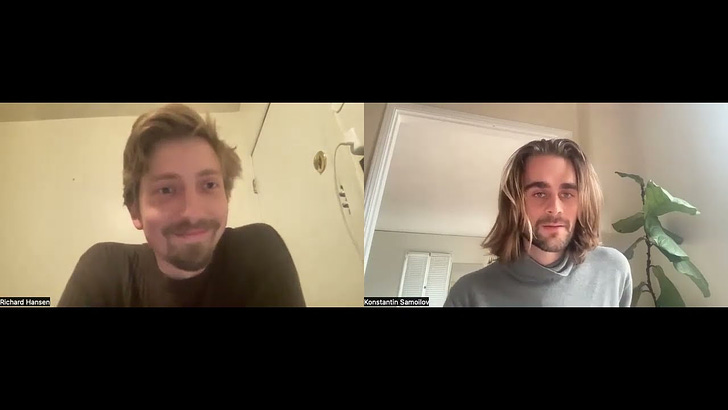



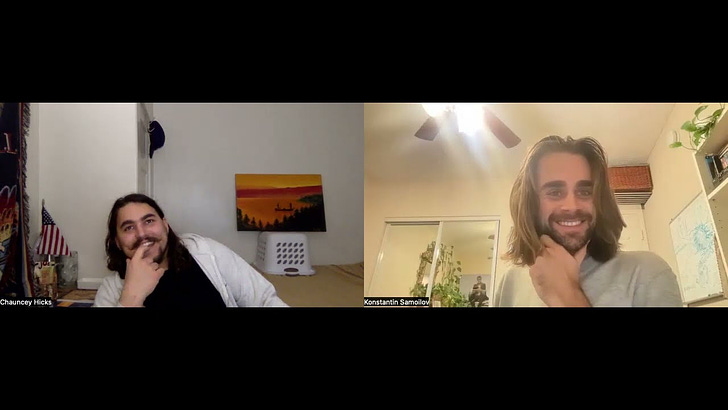
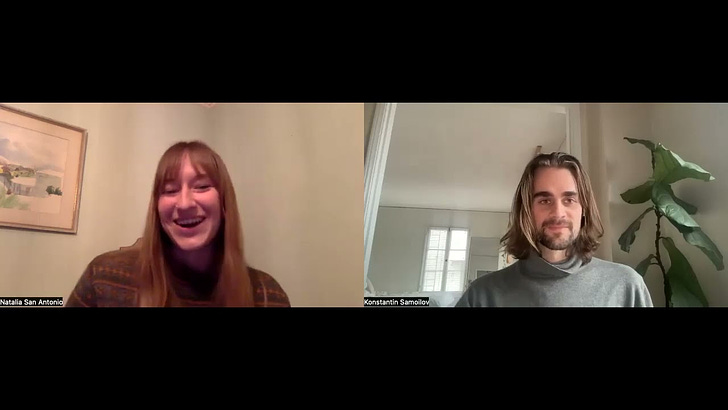
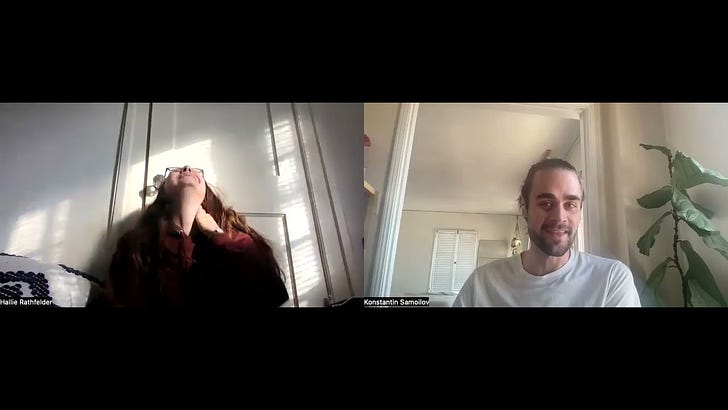
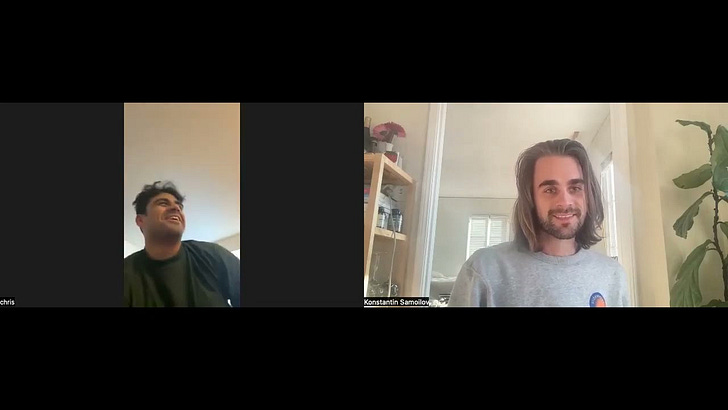


Share this post